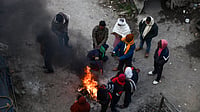Within half a kilometre on the road from Ranchi's Kantatoli to Jamshedpur, one can find shops in dilapidated condition within 100 metres on the road to the left that leads to the Quraishi locality. One such 12 by 10 shabby structure, with discoloured and cracked walls, broken windows, and asbestos on top, lies in a space of four feet.
Fifteen years ago, this structure with a raised platform built on both sides, used to be filled with customers buying meat. This used to be sufficient for the family of Khaleel Qureshi and his four sons Shanu, Aazam, Israil, and Nizaam to live happily.
Slaughter prohibition, however, changed the scenario, bringing a bad omen for them. Twenty-year-old Imran Quraishi is the younger son of Aazam Quraishi. He has been leaving the house at six in the morning every day, ever since he was young. He says to Outlook, “Once our shop gave employment to many. Today, I am forced to work at someone else’ shop for Rs 400 per day. Once our shop was closed, our father became jobless. I and my brother had to discontinue our studies and start earning. Six years ago our father passed away due to this grief. Our mother and younger sister stay with us. We are working so that our sister receives her education.”
Imran says that along with his father, he lost two of his uncles. One of them stayed separately on account of work. The family received 20 kgs of rice from the Government which has been a big saviour for them. Imran says that had the house been partitioned, they might have received money for Government accommodation.
Central Minister Arjun Munda had banned slaughterhouses across the state, under Cow Progeny Act 2005, when he was the CM of Jharkhand. This led to the closure of a slaughterhouse at Kantatoli and thereby all the meat shops closed down. With time, all the buildings turned into ruins. People are forced to struggle daily to survive.
People of the Quraishi locality inform that before 2005 the shop of Khaleel Quraishi did a very good business. With his earnings, he was able to get separate concrete shops constructed in the same lane for his four sons. At present, the shops are in very bad shape and the terrace too is falling.
Tauhid Quraishi used to run his meat shop opposite Khaleel's shop. Now he is forced to work for Rs 300 per diem as a labourer at someone’s place.
Speaking about his daughters’ education, Tauhid Quraishi is filled with emotions, “All my four daughters are very good at studies. Sahiba, the daughter who is the middle child, secured 77 per cent marks in the 2021 metric exams. Since she is very good at science subjects, people have asked me to continue her studies further. Had I been financially strong, I would have made her an engineer. I have arranged the marriage of my elder daughter, Enam Nisha. I will get her married once she completes her graduation in 2024. She wanted to do her MA and B Ed courses. Had the slaughterhouse not been closed, we would be in a position to fulfil all our wishes.”
Tauhid says that he was able to earn Rs 500 to Rs 600 daily till 2007-08. Because of financial constraints, Sahiba had to opt for Commerce in the 12th standard. Otherwise, she could have opted for Science and pursued an engineering course. He is not sure how his other daughters Atika Firdaus, in 6th grade, and Daraksha Fatima, in 5th grade, will continue their studies as it seems a herculean task now.
Tauhid and his brothers are, together, six siblings. After the closure of the slaughterhouse, all of them are forced to work as labourers at different places to look after their families.
According to Jharkhand State Jamitul Quraish, Quraishi constitutes 4 lakh population in the state and even today 80 per cent of this population is associated with ancestral business of animals. According to the organisation, there is at least one slaughterhouse in each district of the state, while some districts have two as well. These were run only after seeking permission and a licence issued by the Municipal Corporation. At present, all of these have been closed for many years now.
Mujib Quraishi, President of the organisation, says, “The Quraishi community of the village is much more adversely affected than the community living in the cities. They are forced to migrate; they are unemployed. Due to the ban, there is smuggling of animals and exploitation of farmers. People are doing these acts silently, in connivance with the police. All those people who are domineering are engaged in these kinds of acts. However, poor people in the community are scared to do these unlawful acts. They are forced to live a life of abject poverty. If the government starts slaughterhouses, then people would be able to legally sell meat, thereby improving their financial status. We had written several letters to the CM. We had met him and briefed him about our problems. Six months before, CM Hemant Soren had convinced us that he would look after all our problems. However, nothing has been done so far.”
Jharkhand Jaimitul Quraish believes that due to the closure of the slaughterhouses, the younger boys of the Quraishi community are becoming drug addicts. The organisation is running campaigns against this. According to the media reports, addiction to tablets, brown sugar and e-cigarettes is rapidly increasing among the youth.
Sixty-year-old Aslam Quraishi had lost two of his sons, Monu (25) and Chotu (15) due to their addiction to drugs.
Aslam Quraishi says, “There is no work. Our community work is closed. My children sometimes work in chicken shops and sometimes at bus stands. Whatever the meagre amount of Rs 100 or 200 was earned, he used to spend on drugs. When he came back home he used to ask for more money and fight. We could never meet his demands. We used to counsel him but in vain. I work as a porter. I earn Rs 200 to Rs 300 a day. And sometimes there is no work.”
Manu had two children, who are now being looked after by their grandfather Aslam Quraishi. His elder son works as a labourer and stays separately with his family.
Thirty-year-old Arman Quraishi (name changed) is a drug addict. He says, “There has been no work for so many years. When there is no work, one is bound to be tensed. Sometimes I make the passengers sit inside the vehicle and sometimes I work at the bus stand. I get a maximum of Rs. 200 a day. I have a big family. We used to have a shop at Gudri Chowk, Ranchi. Once animals were butchered at the slaughterhouse of Kantatoil, we used to sell these at Gudri Chowk. My three uncles, father and three brothers were leading a satisfied life. Now all my brothers are working as labourers. My uncle rides a cart and my father sits at a betel shop. We are in a bad state. If a person loses everything, he is bound to take drugs.”
Many other organisations, including the Jharkhand State Jamiatul Quraish Organisation, also believe that since the complete closure of the slaughterhouse, the cases of mob lynching have increased in the state.
According to the All Muslim Youth Association (AMYA), from March 17, 2016, till December 4, 2022, there are almost 58 cases of mob lynching, where 35 people have lost their lives. However, the state government believes that 46 cases of mob lynching have taken place between 2016 and 2022. S Ali, President of AMYA, says, “In the name of animals, people who take animals for grazing or sell animals were targeted and killed in the name of religion and caste. For the first time, two Muslims were hanged from a tree in Balumath in the name of cow, making it the first mob lynching case in the state.”
S. Ali says that the government had promised to bring a law against mob lynching in its election campaigns. However, it has not fulfilled its promise to date. The Jharkhand government passed a bill in the assembly on 21 December 2021, namely, Prevention of Mob Violence and Mob Lynching Bill 2021. Under this, there was a provision of a fine of Rs 25 lakh in addition to rigorous imprisonment for the convict. But this bill has not been implemented ever since and the same was returned by the governor.
Dr Shahnawaz Quraishi, an educationist, says that the closure of the work of the Quraishi community has not only impacted them financially but educationally too and they have gone further back. He says, “Due to poor financial status, their children had to drop out of school. One can take the example of Al-Quraish Talimi Mission School located at Kantatoli built in 1983. Till 2013, this school had more than a thousand children. Now the figure has reduced to 150. Here most of the children belong to the Quraishi community. This school was run by the panchayat of the Quraishi community. Although the fee here is much less than that of other schools, still people are not able to send their children to study.”
(Translated by Kaveri Mishra)























